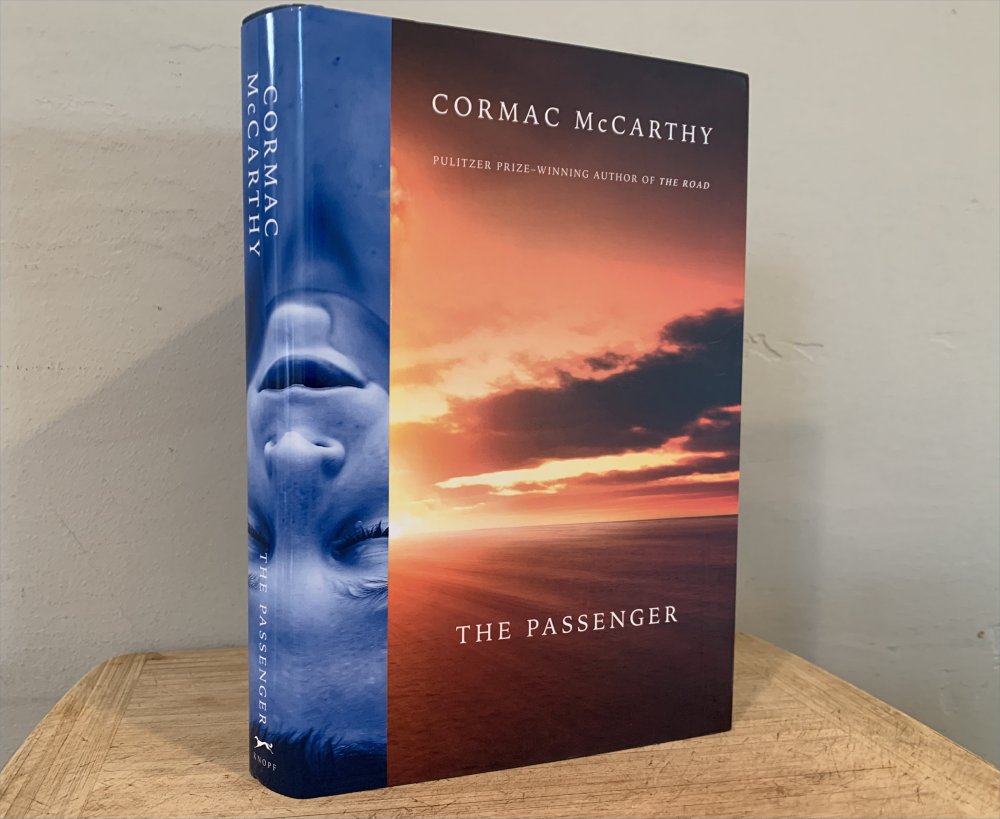Cormac McCarthy, Philip K. Dick, Top Horror Stories, SF for Beginners, the Storytelling Bias, latest NYTBR SF/F reviews, Mathematical fiction
First, about the new Cormac McCarthy novels.
Slate, Laura Miller, 26 Oct 2022: The Grim Return of Cormac McCarthy, subtitled “At 89, McCarthy is publishing two new novels, confused and confusing, arguing that life is brutal and meaningless. Why?”
New York Times, John Jeremiah Sullivan, 19 Oct 2022: Cormac McCarthy’s New Novel: Two Lives, Two Ways of Seeing, subtitled “In ‘The Passenger,’ a pair of siblings contend with the world’s enigmas and their own demons.”
Vox, Constance Grady, 26 Oct 2022: Cormac McCarthy’s two new novels are deliberately frustrating, subtitled “The Passenger is out now, and Stella Maris is out in December. They’re McCarthy’s first new books since 2006.”
The first book was out Tuesday, and I’d preordered it from Amazon, so it’s here. Gorgeous cover design. I’m not sure this or its companion are science fiction in any sense, but the reviews do allude to matters about quantum mechanics, the nature of reality, and so on; and McCarthy has apparently spent much in recent years hanging out at the Santa Fe Institute talking over such matters. So we’ll see.
\\\
For no particular reason I can tell, the New York Times today has a big spread on The Essential Philip K. Dick, subtitled “A nuclear-strength imagination powered his stupendous output. Here’s where to start.” It’s by Molly Young, a book critic for The Times.
It’s a decent selection, with decent takes on 10 PKD titles. The most surprising thing about the piece is that NYT couldn’t find better cover images. Some of them are of overly worn paperback editions.
\\\
Guardian, Simon Crook, 26 Oct 2022: Top 10 horror short stories, subtitled “With Halloween looming, these tales by authors from Shirley Jackson to Stephen King are guaranteed to keep you awake as the nights close in”
I’m not a horror reader at all, but I checked this out (posted by Ellen Datlow on Facebook) to see if I recognized any of the stories at all. I only recognized two specific titles, by Lovecraft and Jackson, though I’ve read stories by at least four of the other authors. Having reread *all* of Bradbury’s short stories a few years ago, I find “The October Game” an odd choice, simply on plausibility grounds.
\\\
Five Books, Nicholas Whyte, 31 Jul 2019: The Best Sci Fi Books for Beginners
“Interested in science fiction, but not sure where to begin? Sceptical of spaceships, but never really given them a chance? We asked Nicholas Whyte, administrator of the World Science Fiction Society’s renowned annual Hugo Awards, to recommend five of the best sci fi books that should appeal to readers new to the genre.”
Moving past the use of that horrible abbreviation, Whyte is certainly an authority to be trusted, though I’m not sure I’d agree with his selections. For beginners? That dense tome Dune? But I’m not going to get started on what I would choose just now.
This is an interesting site, with many similar lists to this one. Some of them are linked in the right sidebar of the linked page. The one I linked to today was one about The Best Science Fiction of 2022: The Arthur C. Clarke Award Shortlist by Andrew M. Butler, despite its misnomer; the finalists for this award were published in 2021. Also, the winner was just announced today: the first one, by the intriguingly named Harry Josephine Giles, an 80-page novel in verse.
There are lots of other lists on this site, on many different topics, that I’ll have to sit down and thoroughly explore one day.
\\\
Suitable for this post is a review from last week about a book about narrative.
NYT, Jennifer Szalai, 19 Oct 2022: How Reality Got ‘Storified’ and What We Can Do About It, subtitled “In ‘Seduced by Story,’ the literary critic Peter Brooks argues that a ‘mindless valorization of storytelling’ has crept into every aspect of public discourse, from politics to cookie packages, with alarming results.”
Many angles here. Storytelling, the narrative bias, seems built into human nature, as a way of understanding a world not always but usually built on cause and effect. Science fiction, historically a conservative genre in terms of storytelling values, has often emphasized the “beginning, middle, end” arc, with occasional breakouts such as the “New Wave” of the 1960s. This is an example of a book I doubt I will buy, but will certainly read this review of in detail.
\\\
NY Times, The Ezra Klein Show, 18 Oct 2022: A Legendary World Builder on Multiverses, Revolution and the ‘Souls’ of Cities, subtitled “How the fantasy and science-fiction writer N.K. Jemisin thinks about people and difference in our complex world.”
Interview and transcript. Despite here three consecutive Hugo Awards, Jemisin is an author I’ve never read.
\\\
And here’s the latest monthly SF/F review column in the New York Times Book Review.
NYTBR, Amal El-Mohtar, 14 Oct 2022: The Magic of Translation, subtitled “New books about language, fairy tales and the paths we don’t pursue.”
When I skim these essays once a month, I’m alert to seeing if any of the titles reviewed are actual, unambiguously, science fiction. Very few of them are.
\\\
And here’s a website compiling stories, novels, plays, etc., with mathematical content.
\\\
And earlier this month, a review of what seems to be one of the most interesting SF novels of the year, by a trusted reviewer.
Slate, Laura Miller, 3 Oct 2022: Among the Octopuses, subtitled “A new sci-fi thriller imagines what a soul might look like among the eight-legged—and searches for it in humanity, as well.”
It’s about Ray Nayler’s The Mountain in the Sea. I have a copy right here on my TBR shelf.






